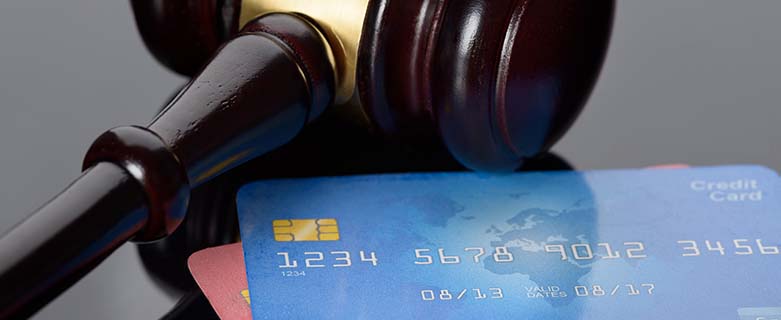
Chargeback Laws: What Are They and Why Do They Matter?
By Chris Alarie on May 25, 2022
“The law will never make men free; it is men who have got to make the law free.”
— Henry David Thoreau
Chargebacks did not appear out of thin air and they do not operate according to some sort of self-justifying principle. Their implementation is largely guided by card brand policies. But those policies exist in order to fulfill the requirements of federal laws and regulations. While most practical chargeback information for merchants comes from those card brand policies, it can still be instructive to examine the laws that underlie chargebacks.
Truth In Lending Act
The Truth in Lending Act (TILA) of 1968 was among the first and most significant consumer credit laws of its era. It promotes the informed use of consumer credit with regulations relating to disclosures to cardholders; consumer rights for mortgages; and rules relating to credit card billing disputes, annual percentage rate (APR), loan terms, and borrower costs. It is mostly codified in a section of the Code of Federal Regulations (CFR) known as Regulation Z.
By setting federal rules and standards for consumer credit, it laid the groundwork for what would eventually become chargebacks. In many cases, important federal regulations governing chargebacks have taken the form of amendments to and updates of the TILA.
Fair Credit Billing Act
One such amendment was the Fair Credit Billing Act (FCBA) of 1974. This was the first amendment to the TILA that explicitly included regulation of credit cards. Among the most important provisions of this law is a regulation allowing customers to dispute billing errors by sending notice to the creditor. The cardholder has 60 days to dispute the charge with their issuer for reasons relating to lost cards, suspected fraud, and other consumer dissatisfaction such as goods or services that were not delivered.
This is the regulatory mechanism that precipitated the creation of the chargeback system by the banks and card brands. However, it does not outline any specifics of how these consumer chargeback rights should be administered. Instead, the law directs the card brands to create the procedures to fulfill the FCBA’s requirements.
Electronic Funds Transfer Act
The Electronic Funds Transfer Act (EFTA) of 1978 establishes consumer rights for electronic funds transfers. This involves ATMs, bank cards, and debit cards. For the purposes of this discussion, the most important aspect of the EFTA is that it extended the chargeback rights associated with credit card purchases to debit card purchases, as well. It is codified in the United States Code as Regulation E.
Uniform Commercial Code
The Uniform Commercial Code (UCC) is a set of federal codes that serve to harmonize sales laws and regulations that exist at the state level. The section of the UCC that concerns chargebacks is six paragraphs that can be found under “U.C.C. – Article 4 – Bank Deposits and Collections (2002) > Part 2. Collection of Items: Depositary and Collections Banks > § 4-214. Right of Charge-Back or Refund; Liability of Collecting Bank; Return of Item.” Those six paragraphs read as follows:
(a) If a collecting bank has made provisional settlement with its customer for an item and fails by reason of dishonor, suspension of payments by a bank, or otherwise to receive settlement for the item which is or becomes final, the bank may revoke the settlement given by it, charge back the amount of any credit given for the item to its customer's account, or obtain refund from its customer, whether or not it is able to return the item, if by its midnight deadline or within a longer reasonable time after it learns the facts it returns the item or sends notification of the facts. If the return or notice is delayed beyond the bank's midnight deadline or a longer reasonable time after it learns the facts, the bank may revoke the settlement, charge back the credit, or obtain refund from its customer, but it is liable for any loss resulting from the delay. These rights to revoke, charge back, and obtain refund terminate if and when a settlement for the item received by the bank is or becomes final .
(b) A collecting bank returns an item when it is sent or delivered to the bank's customer or transferor or pursuant to its instructions.
(c) A depositary bank that is also the payor may charge back the amount of an item to its customer's account or obtain refund in accordance with the section governing return of an item received by a payor bank for credit on its books (Section 4-301).
(d) The right to charge back is not affected by:
(1) previous use of a credit given for the item; or
(2) failure by any bank to exercise ordinary care with respect to the item, but a bank so failing remains liable.
(e) A failure to charge back or claim refund does not affect other rights of the bank against the customer or any other party.
(f) If credit is given in dollars as the equivalent of the value of an item payable in foreign money, the dollar amount of any charge-back or refund must be calculated on the basis of the bank-offered spot rate for the foreign money prevailing on the day when the person entitled to the charge-back or refund learns that it will not receive payment in ordinary course.
Conclusion
While knowing the details of the legal foundation for chargebacks, ultimately the most important thing for merchants to know is the policies that the card brands and banks have created in order to enact these regulations. Ultimately it will be the banks and card brands that process chargebacks and make any decisions about how they will be implemented.


